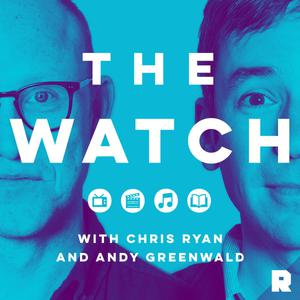
Plain English with Derek Thompson
The Ringer
- 1 hour 15 secondsPlain History Volume 1: Who Killed President James Garfield?
This is the first episode of a little experiment we’re trying this year, a podcast within a podcast on history that we’re calling, simply enough, 'Plain History.' There are, I am well aware, a great number of history podcasts out there. But one thing I want to do with this show is to pay special attention to how the past worked. In this episode, for example, we're using the assassination of an American president to consider the practice of medicine in the 19th century.
Our subject today is the bestseller 'Destiny of the Republic' by the historian Candice Millard, on the incredible life and absurd and tragic death of President James Garfield.
In the summer of 1876, the United States celebrated its 100th birthday at the U.S. Centennial Exhibition in Philadelphia. Of the millions of people who walked through the grounds, one was Garfield, who attended the centennial with his wife and six children. In four years' time, he would be elected president at a shocking and chaotic Republican convention. But at the time, he was a 44-year-old congressman known in Washington for being a rags-to-riches genius.
Garfield was a perfect match for the centennial grounds, which were themselves a gaudy showcase of genius. In Machinery Hall, visitors could pay for a machine to embroider their suspenders with their initials. They could gaze at one of the world’s first internal combustion engines, a technology that would in the next 50 years remake the world by powering a million cars, tractors, and tanks. They could see the first Remington typewriter and Edison telegraph system.
In the Main Exhibition Building, a little-known teacher for the deaf caused a riot with his science experiment. In one room, the teacher held up a little metal piece to his mouth and read Hamlet’s soliloquy into a transmitter. In a separate room, the emperor of Brazil, sitting with an iron box receiver pressed against his ear, heard each word—to be or not to be—reverberating against his eardrum. The teacher’s name was Alexander Graham Bell, and the instrument in question had three months earlier received a patent as the world’s first working telephone.
A few yards away, a scientist named Joseph Lister was having much less success trying to explain his theories of antisepsis to a crowd of skeptical American doctors. He claimed that the same tiny organisms that Pasteur said turned grape juice into wine also turned our wounds into infestations. Lister encouraged doctors to sterilize wounds and to treat their surgical instruments with carbolic acid. But American doctors laughed off these suggestions. Dr. Samuel Gross, the president of the Medical Congress and the most famous surgeon in America, said, “Little if any faith is placed by any enlightened or experienced surgeon on this side of the Atlantic in the so-called carbolic acid treatment of Professor Lister.” American surgeons instead believed in “open-air treatment,” which is exactly what it sounds like.
Here are three characters of a story: James Garfield, Alexander Graham Bell, and Lister’s theory of antisepsis. They were united at the 1876 centennial. They would be reunited again in five years, under much more gruesome circumstances, brought together by a medical horror show that would end with a dead president.
If you have questions, observations, or ideas for future episodes, email us at [email protected].
Host: Derek Thompson
Guest: Candice Millard
Producer: Devon Baroldi
Learn more about your ad choices. Visit podcastchoices.com/adchoices
21 January 2025, 11:00 am - 41 minutes 27 secondsWhat's the Truth About Alcohol, Cancer, and Your Health?
Today's episode has been a long time coming. For years, more scientists and health influencers have claimed that even moderate drinking does serious damage to one's health. As someone who likes being healthy and also loves a glass of wine (or scotch), Derek really wanted to understand this issue more deeply. This week, he published a long article in The Atlantic about his research on the health effects of moderate drinking—meaning one or two drinks a night. In today's episode, he breaks down his research process and conclusions, sharing audio from his interview with Canadian health researcher Tim Stockwell, who is one of the most prominent skeptics of the supposed benefits of moderate drinking.
If you have questions, observations, or ideas for future episodes, email us at [email protected].
Host: Derek Thompson
Guest: Tim Stockwell
Producer: Devon Baroldi
Links
- Derek's original article in The Atlantic (free gift link!): https://www.theatlantic.com/ideas/archive/2025/01/moderate-drinking-warning-labels-cancer/681322/?gift=o6MjJQpusU9ebnFuymVdsD7vJ9S6Vd2LMCE-zROPKQs&utm_source=copy-link&utm_medium=social&utm_campaign=share
- "The Battle Over What to Tell Americans About Drinking" in the NYT: https://www.nytimes.com/2025/01/01/health/alcohol-dietary-guidelines.html
- "Alcohol and Cancer Risk 2025" The U.S. Surgeon General's Advisory https://www.hhs.gov/sites/default/files/oash-alcohol-cancer-risk.pdf
- A meta-analysis in The Lancet on alcohol use and burden for 195 countries and territories https://www.thelancet.com/article/S0140-6736(18)31310-2/fulltext
- Vinay Prasad on alcohol and the meta-analysis https://www.drvinayprasad.com/p/what-is-the-truth-about-alcohol-consumption
- Emily Oster on alcohol and health https://parentdata.org/alcohol-and-health/
- Tim Stockwell, et al, meta-analysis on alcohol, 2023 https://jamanetwork.com/journals/jamanetworkopen/fullarticle/2802963
- "Associations between alcohol consumption and gray and white matter volumes in the UK Biobank" https://www.nature.com/articles/s41467-022-28735-5
Learn more about your ad choices. Visit podcastchoices.com/adchoices
17 January 2025, 11:00 am - 1 hour 6 minutesThe L.A. Fires: How They Happened, Climate Change’s Role, and What the City Must Do Now
With so many confusing narratives unfolding around a fire that is still raging out of control, I wanted to talk to somebody I knew and trusted to get stories like this right. Robinson Meyer is the founder and editor of Heatmap News and a former staff writer at The Atlantic, where he covered climate news and related disasters. We talk about why this Los Angeles fire is so unusual, how it differs from most recent forest fires in California, the role of climate change, and what Los Angeles and other places can do to protect people from the inevitability of future disasters.
If you have questions, observations, or ideas for future episodes, email us at [email protected].
Host: Derek Thompson
Guest: Robinson Meyer
Producer: Devon Baroldi
Links:
- Could More Controlled Burns Have Helped?
- 5 Startups Working on LA Fires
- What Started The Fires?
- Why LA’s Fires Are Exceptionally Hard to Fight
- Does climate change make the Santa Ana winds worse?
Learn more about your ad choices. Visit podcastchoices.com/adchoices
14 January 2025, 11:00 am - 1 hour 12 minutes‘The Anti-Social Century’: America’s Epidemic of Solitude—and How to Fix It
My new feature for The Atlantic magazine is called "The Anti-Social Century." It's a long article that revolves around a simple point: Americans are now spending more time alone than ever. This surging solitude is changing our personalities, our politics, our culture, and our relationships. On this episode, University of Chicago psychologist Nick Epley joins the show to talk about why aloneness matters. We talk about his research on relationships and solitude, on why we need people in our lives, and why sometimes we disregard or misunderstand that need, and why "social fitness" is so critical to a good life.
If you have questions, observations, or ideas for future episodes, email us at [email protected].
Host: Derek Thompson
Guest: Nick Epley
Producer: Devon Baroldi
Learn more about your ad choices. Visit podcastchoices.com/adchoices
10 January 2025, 11:00 am - 1 hour 12 minutesThe Big 2025 Economy Forecast: AI and Big Tech, Nuclear’s Renaissance, Trump vs. China, and What’s Eating Europe?
Happy new year! And what better way to celebrate the freshly torn calendar page than by welcoming one of Derek's favorite writers to the show to tell us what's in store for the 2025 economy. Michael Cembalest is the chairman of market and investment strategy for JPMorgan Asset Management, and the author of the truly spectacular newsletter, 'Eye on the Market.' Today, we start with stocks and describe the truly historic—and historically unprecedented—dominance of the so-called Mag-7 tech giants. Then, we draw the connection between Big Tech’s historic run and the surge of AI spending. After a discussion on the history and future of nuclear power in America, we do a pit stop on the European economy, where we evaluate the continent’s tradeoff between safety and growth, and move on to China to disentangle that economy’s slowdown. Finally, we connect it all back to a Trump agenda that is a fascinating brew of old-fashioned Reaganite deregulation, newfangled crypto enthusiasm, mid-19th century tariff obsession, mid-20th century industrialization policy, and ... a bunch of other ingredients that I think I’ll just let Michael tell you about.
If you have questions, observations, or ideas for future episodes, email us at [email protected].
Host: Derek Thompson
Guest: Michael Cembalest
Producer: Devon Baroldi
Learn more about your ad choices. Visit podcastchoices.com/adchoices
7 January 2025, 11:00 am - 1 hour 18 minutesThe Year's Biggest Breakthroughs in Science and Tech (Feat.: OK, But Seriously, What Is Quantum Computing?)
Our final episode of the year is also my favorite annual tradition: conversations with scientists about the most important and, often, just plain mind-blowing breakthroughs of the previous 12 months. Today we’re talking about "organ clocks" (we'll explain) and other key biotech advances of 2024 with Eric Topol, an American cardiologist and author who is also the founder and director of the Scripps Research Translational Institute. But first, Derek attempts a 'Plain English'-y summary of the most confusing thing he's ever covered—QUANTUM COMPUTING—with a major assist from theoretical computer scientist Scott Aaronson from the University of Texas at Austin.
If you have questions, observations, or ideas for future episodes, email us at [email protected].
Host: Derek Thompson
Guests: Scott Aaronson and Eric Topol
Producer: Devon Baroldi
Learn more about your ad choices. Visit podcastchoices.com/adchoices
31 December 2024, 11:00 am - 1 hour 9 minutesA Mysterious Health Wave Is Breaking Out Across the U.S.
Why do Americans die younger than citizens of other rich countries? The most important reason is that life in America is inexcusably dangerous. The U.S. has more fatalities from gun violence, drug overdoses, and auto accidents than just about any other similarly rich nation, and its obesity rate is about 50 percent higher than the European average. Put this all together, and the U.S. is rightly considered a “rich death trap” for its young and middle-aged citizens.
That’s the bad news. Now here’s the good news. In the past 12 months, quietly and without much media fanfare, the government reported that drug deaths declined, murders declined, traffic fatalities declined, and the standard measure of obesity declined. This inside straight of good news has never happened before in the 21st century—and perhaps decades before that.
Today’s guest is Charles Fain Lehman. He’s a fellow at the Manhattan Institute whose expertise is unpacking complex trends in the most gruesome areas, like drugs, murder, and death, in America. Today, he explains why the U.S. seems to be experiencing a sort of mysterious health wave and whether we should expect it to last.
If you have questions, observations, or ideas for future episodes, email us at [email protected].
Host: Derek Thompson
Guest: Charles Fain Lehman
Producer: Devon Baroldi
Link: https://www.theatlantic.com/ideas/archive/2024/12/violence-obesity-overdoses-health-covid/681079/
Learn more about your ad choices. Visit podcastchoices.com/adchoices
27 December 2024, 11:00 am - 1 hour 3 minutesThe Productivity Paradox: Why Less Is More With Oliver Burkeman
So, here’s a scenario: It’s Monday. And you open up whatever calendar or planner or to-do list you use to organize the essential activities of the upcoming week. There’s a large project due Thursday. And an important meeting Wednesday. Your nine-to-five is chockablock with meetings, and your kid has a school function Tuesday, and there are holiday gifts to buy before Friday, and just when you’re pretty sure your week couldn’t possibly take one more featherweight of responsibilities, the HVAC unit sputters to a stop, requiring a call to the local heating and cooling guys, which obliterates four hours of Monday.
You can tell yourself that this week is cursed. Or you can tell yourself the truth: Feeling an imbalance between the time you have and the time you want to have isn’t really a curse at all. It’s a bit more like ... the definition of being alive. To see life clearly in this way is what I’ve come to think of as Oliver Burkeman brain. Oliver is the author of the books 'Four Thousand Weeks' and 'Meditations for Mortals.'
Today, in what's become a holiday tradition of sorts, we bring back Oliver to chat about doing more by doing less, the dubious benefits of scheduling, and the freedom that comes from accepting our limitations.
If you have questions, observations, or ideas for future episodes, email us at [email protected].
Host: Derek Thompson
Guest: Oliver Burkeman
Producer: Devon Baroldi
Learn more about your ad choices. Visit podcastchoices.com/adchoices
20 December 2024, 11:00 am - 1 hour 23 minutesWhy American Health Care Is a "Broken System"
Last week, UnitedHealthcare CEO Brian Thompson was shot to death outside a hotel in Manhattan by a young man motivated by rage at the insurance industry. His rage is clearly felt widely. In the aftermath of the killing, many people seemed to delight in the man’s assassination. Their reaction was a grotesque illustration of something real: There is an enormous amount of anger and frustration about the state of American health care. And there ought to be. The U.S. is the most expensive health care system in the world, while for many people it delivers bad care at exorbitant prices.
But anger is not always a signal of accuracy. And while some of the most popular reasons to be furious at American health care are based on truth, many are based on misunderstandings and myths—especially about the insurance system.
This week, I wanted to present a calm and informed conversation with a health care expert to walk me through what I consider the biggest health care questions of the moment. Why are American health care costs so high? How much are insurers to blame? How do other countries handle health care differently? What can we learn from them? And what, if anything, should make us optimistic about the future of American health care?
Today we have two guests. First we have Jonathan Gruber, an economics professor at MIT and a key architect of several health care laws, including the 2006 Massachusetts health care reform and the Affordable Care Act. Jon walks me through the key drivers of health inflation and American anger at the health care system. The second, David Cutler, is an economics professor at Harvard who served as senior health care adviser for Barack Obama; he helps us think comparatively about the weaknesses and strengths of the U.S. health system and what reforms could help Americans live longer and healthier lives.
If you have questions, observations, or ideas for future episodes, email us at [email protected].
Host: Derek Thompson
Guests: Jonathan Gruber and David Cutler
Producer: Devon Baroldi
Learn more about your ad choices. Visit podcastchoices.com/adchoices
13 December 2024, 11:00 am - 52 minutes 58 secondsIs Crypto Entering a New Golden Age—or Just a New Era of Failed Promises?
The crypto industry seems poised for a new golden age. But what exactly does that mean? Who would benefit? And, oh by the way, what does this technology do other than serve as a set of assets to bet to the moon?
I have lots of questions about the state of crypto right now. Last week, Bitcoin traded above $100,000 for the first time in history. Its price has skyrocketed since Donald Trump’s win, as a wave of investors bet that the next four years will mark a new renaissance. And this isn’t just a time for optimism. It’s also a time for recrimination. In the last few weeks, several major tech figures, including the venture capitalist Marc Andreessen, have condemned democrats for what they describe as an illegal war on crypto.
Austin Campbell is finance vet, an adjunct professor at Columbia Business School, and the founder of Zero Knowledge Consulting. Today, we talk about the purported war on crypto, starting with the origins of "debanking" practices under Obama; we talk about why crypto now seems like a majority-republican technology in an industry that has historically been democratic; we talk about the biggest use cases of crypto around the world; and Austin tells me why he thinks many people in the industry still aren't thinking clearly about the future of finance.
Host: Derek Thompson
Guest: Austin Campbell
Producer: Mike Wargon
Learn more about your ad choices. Visit podcastchoices.com/adchoices
6 December 2024, 11:00 am - 1 hour 50 minutesMegapod: Why Is There So Much BS in Psychology?
In the last decade, several major findings in social psychology have turned out to be hogwash—or, worse, even fraud. This has become widely known as psychology's "replication crisis." Perhaps you have heard of power poses—based on a study finding that subjects reported stronger “feelings of power” after they posed, say, with their hands on their hips for several minutes. But that finding did not replicate. Or perhaps you have heard of ego depletion—the more famous assertion that, when people make a bunch of decisions, it exhausts their ability to make future decisions. Again: did not replicate.
“There’s a thought that’s haunted me for years,” social psychologist Adam Mastroianni has written. “We’re doing all this research in psychology, but are we learning anything? We run these studies and publish these papers, and then what? The stack of papers just gets taller? I’ve never come up with satisfying answers. But now I finally understand why.”
Today’s episode features two interviews. First, I talk to Adam about his big-picture critique of his own field: how psychology too often fails as a science, and what it can do better. Second, we speak with journalist Dan Engber from The Atlantic, who has been reporting on a billowing scandal in psychology that has enveloped several business school stars—and raised important questions about the field. What is psychology for? What would progress in psychology mean? And how can this field—which might be the discipline I follow than any other in academia—become more of a science?
If you have questions, observations, or ideas for future episodes, email us at [email protected].
Host: Derek Thompson
Guests: Adam Mastroianni and Daniel Engber
Producer: Devon Baroldi
Links:
“Is psychology going to Cincinnati?” by Adam Mastroianni
https://www.experimental-history.com/p/is-psychology-going-to-cincinnati
"I’m so sorry for psychology’s loss, whatever it is" by Adam Mastroianni
https://www.experimental-history.com/p/im-so-sorry-for-psychologys-loss#footnote-anchor-3-136506668
“The Business-School Scandal That Just Keeps Getting Bigger” by Daniel Engber
https://www.theatlantic.com/magazine/archive/2025/01/business-school-fraud-research/680669/
Learn more about your ad choices. Visit podcastchoices.com/adchoices
27 November 2024, 11:00 am - More Episodes? Get the App
Your feedback is valuable to us. Should you encounter any bugs, glitches, lack of functionality or other problems, please email us on [email protected] or join Moon.FM Telegram Group where you can talk directly to the dev team who are happy to answer any queries.
 The Bill Simmons Podcast
The Bill Simmons Podcast
 The Press Box
The Press Box
 The Ringer NBA Show
The Ringer NBA Show
 The Watch
The Watch
 The Rewatchables
The Rewatchables
 The Ryen Russillo Podcast
The Ryen Russillo Podcast